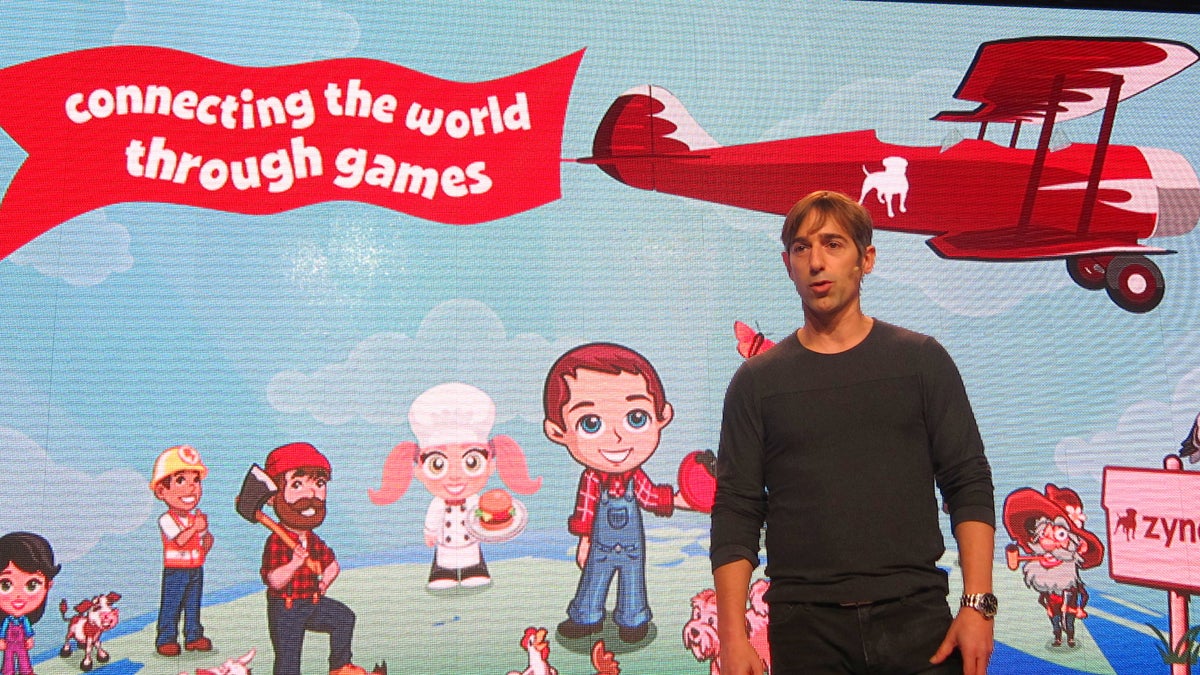Zynga secretly launches developer platform in plain sight
At today's press conference, it sounded like Mark Pincus announced a new platform strategy. It would make sense. But the news seem to have evaporated as it was leaving his lips.

SAN FRANCISCO--At the Zynga press conference today, CEO Mark Pincus dropped a bombshell that, according to the army of press handlers there, I was the only person to hear. "We are building a platform for play," he said. "We're not trying to be the company that makes the next hit game...but it's ok if we do. We're trying to do something broader than that."
Pincus said he's trying to get Zynga to build something similar to the Facebook platform, "but at a game level."
What I heard: Zynga's going to open up its network, and maybe its tools, to non-Zynga developers. This model has worked brilliantly for Facebook, as he said. And Zynga appears to be at the right stage in its growth--huge but at a plateau--to launch an initiative like this.
What I'm supposed to have heard, as three Zynga PR people told me: Zynga Direct is the company's new direct-to-consumer platform for connecting individuals who want to play games together. The new ZTag identity that you can get on Zynga today represents the first "product" on the Zynga Direct platform. Zynga Direct will be a network of gamers that will exist independently of Facebook, even though it will rely on Facebook Connect for sign-up.
This is big news itself. There is a natural tension between Zynga and Facebook. Both companies make money by rubbing people together, via updates and apps (Facebook) or play (Zynga) and then extracting small revenues from the masses via ads or online sales. The more Zynga can shake off Facebook, while not walking away from the social graph that connects its users together, the more influence and money it can keep for itself.
• Zynga works 'social magic' with new games, Project Z
• Why Facebook won't build music service from scratch
• Yes, Google really should worry about Facebook
The Zynga Direct that we're supposed to focus on will let users create their own game identities. You'll soon be able to play your Zynga games on Facebook using this pseudonym and not your real name, although since you log in with Facebook Connect, at some point they will have to be linked. At least at launch.
You should eventually be able to use your ZTag to log into Zynga games you play on Facebook as well as off it. So if you want to play Words With Friends on Google+, or your smartphone, without attaching that instance of the game to your Facebook account directly, yet still play with friends who are on Facebook, it should be possible. As Zynga gets more users on disparate platforms--Facebook, iOS, Google+--it becomes even more important for the company to make its network of users its own, and transcend any one social network that its piggybacking on.
In other words, as it grows, Zynga can't bet the bank on its relationship with Facebook. And as Zynga gets more aggressive with mobile games (it announced four iOS titles today), it also has to figure out which of its platform partners it's going to be happy paying. At the moment, an in-app purchase on a iPad Facebook game will generate a bill from both Facebook and Apple. Zynga might be wanting to reduce the number of companies it has to pay by half. And it's easier to cut out the social platform than the operating system.
But back to the now-you-see-it, now-you-don't version of Zynga Direct that Pincus (I think) announced, the Zynga Direct that will allow developers to connect with users, not the one that will allows users to connect with each other: It's time. Zynga has strong user numbers and awesome analytics about how users interact (4 billion "neighbor connections" it does analytics on, according to Zynga CTO Cadir Lee). The company has a team of strong social and game developers. But imagine what we might see if outside developers could get into this network.
After all, Facebook is a social powerhouse in part because it opened its platform to developers like Zynga. Now Zynga could become a platform unto itself and pass the baton down the line to a new generation of developers and entrepreneurs. Done right, there is more money to be made by building a platform than by building a few good apps.
I believe that is what Pincus intended to convey this morning. The timing is right. It will help the company grow. It's one of the ways Facebook became huge. And it's the smart next move for Zynga.

